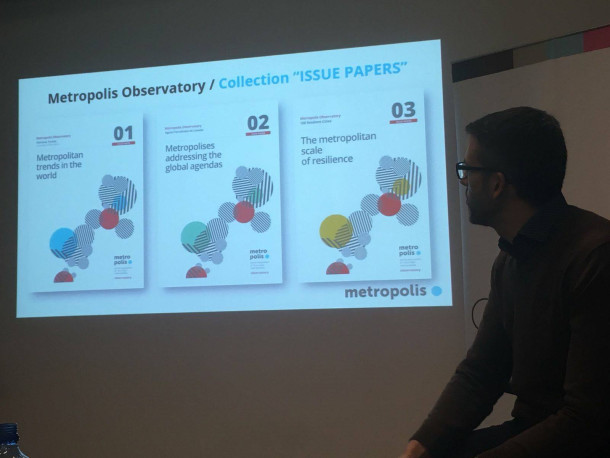 MetroLab
MetroLab
Metropolis Observatory presentation at the MIT
From 8 to 19 January, the third edition of the Metro Lab course was held at the Massachusetts Institute of Technology (MIT). The main topics on the course revolved around creating an academic discipline focused on metropolitan governance, as well as environmental challenges, and possible solutions, from a metropolitan perspective. Metropolis was represented on the course for the second year running, this time by the attendance of Project Officer Eugeni Villalbí, who gave a presentation on the Metropolis Observatory, which he is responsible for.
The course was divided into two week-long modules, which could be taken together or individually. Eugeni Villalbí took part in the first module, titled Co-creating the Metro Discipline, where he had the opportunity to present Metropolis as a hub in an increasingly global and urban context. He also explained the objectives of the Metropolis Observatory in terms of analysing this urban context and putting forward recommendations for dealing with the main challenges faced by metropolitan areas. “The course was a great opportunity to share our work, which is carried out along the exact same lines as the content of Metro Lab: creating a discipline and producing knowledge that can act as solid foundations for metropolitan governance, which is one of the main pillars of the urbanisation process we are currently going through”, said Villalbí.
The course was also an opportunity to present the collection of issue papers published by the Metropolis Observatory, which offer frames of reference concerning the need to include a metropolitan perspective when managing cities and their metropolitan areas. Eugeni Villalbí also announced the Metropolis new collaboration with the London School of Economics (LSE-Cities), which will establish a system of metropolitan indicators to monitor and compare what is happening in our metropolises in the fields of metropolitan governance, economic development, social cohesion, gender equality, sustainability and quality of life.
The activities at the Metro Lab 2018 were based on learning methods that encouraged the exchange of experiences between professionals with a career based on different aspects of metropolitan governance, whether working in local governments, multilateral agencies, urban planning institutions, private companies or academic institutions in a number of continents. The diverse points of view and varied analyses of current situations, together with a learning method based on participation, debates, workshops, panels and field trips, allowed students to exchange experiences and knowledge in order to better grasp the complexity of the actual metropolitan situation.
One of the highlights of the course were the presentations given by those acting as instructors, including Pedro Ortiz, senior consultant on urban issues with extensive international experience in metropolitan matters. He asserted that the factors that guarantee a metropolitan vision, and that therefore encourage the corresponding metropolitan governance, are those elements that unite a metropolitan area through spatial continuity, such as grey infrastructure (transport infrastructure, waste management, etc.). and green infrastructure (green spaces, rivers, etc.). The second module, Metropolitan Environmental Solutions, made further contributions to this perspective, with a deeper look at content related to the aforementioned infrastructures.
Using the contributions provided by Metropolis, and those made by other instructors and students, the aim is to produce a publication that makes progress towards creating a metropolitan academic discipline.
The general objective of the courses run by Metro Lab is to increase public awareness and bring together applied knowledge in dealing with metropolitan challenges. The ultimate goal is to reduce the gap between theory and practice in terms of the metropolitan phenomenon. The Metro Lab 2018 was part of the annual period of independent activities that MIT offers to communities of learners from around the world across its different departments, and was held at the headquarters of the Environmental Solutions Initiative at the Institute. The Metro Lab Initiative is run and coordinated by David Gómez Álvarez, who holds a PhD/MPhil in Public Administration, specialising in development policies, from New York University (NYU). He organises the course with Gabriel Lanfranchi, founder of the Cities Program at the Center for the Implementation of Public Policies Promoting Equity and Growth (CIPPEC).

